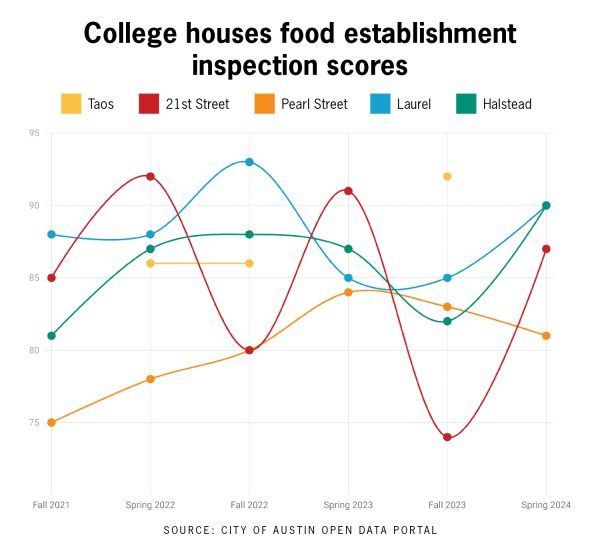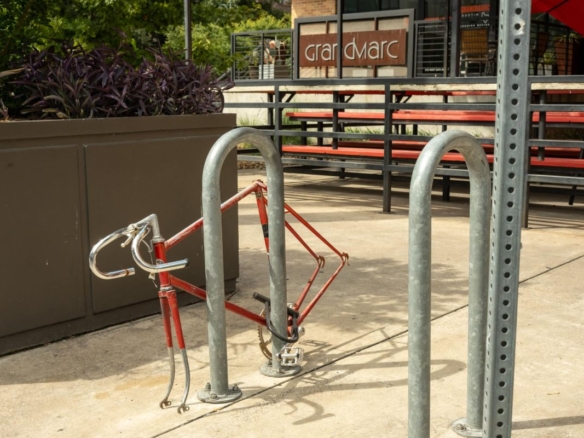Grant Gilker’s freshman-year dorm saw the blossoming of close connections and the establishment of a home away from home through late nights studying, cooking with friends and great conversations.
After a year of living on campus, Gilker, a Plan II and playwriting and directing senior, said they were excited to relocate to a West Campus apartment. Despite moving in with a close friend, Gilker said they didn’t enjoy the reality of apartment living.
“There’s no reason to invest in your community or your neighborhood or your neighbors because it’s all transient and temporary,” Gilker said. “The landlords certainly know that and treat you like that.”
Hoping to recreate the same sense of belonging they felt in their freshman year housing experience, Gilker decided to move into one of the many cooperative housing communities around the University. Gilker is now the chair of the board of directors for College Houses and a co-director of Pearl Street Co-op.
For decades, College Houses and ICC Austin, two nonprofit cooperative organizations, have offered a more affordable living option amidst continually increasing rent prices in Austin. According to their websites, College Houses’ seven and ICC Austin’s nine houses and buildings that are sprinkled around West Campus can provide housing to over 800 students in total. Unlike conventional apartment-style living, many spaces are communal, including shared kitchens, bedrooms, bathrooms and common rooms, engendering a sense of community.
The houses function through a democratic voting system and by collective work and coordination between the residents and each organization’s management office. Most of the work, including mandatory weekly labor hours, is completed by the students.
“Picture an apartment complex that you’ve lived in in the past, except instead of a landlord owning the place and the landlord hiring the manager and deciding how things work, you all jointly own the place and make decisions about who to hire as the manager and make decisions about what the leases should say,” said Daniel Miller, the College Houses executive director and a former co-op resident.
Although this system empowers residents to decide how their house runs, it causes problems for some residents when others fail to complete their labor or have different definitions of cleanliness. Residents also voiced difficulty connecting with their respective management offices when significant issues arise. Some residents found that management made some decisions for the house without their knowledge.
The city of Austin’s open data portal shows a history of unstable food establishment inspection scores for many of College Houses’ properties. While a majority of scores ranged in the high 80s, 10 inspections at three of the houses received a score under 85 in the past three years — one house received a 74 for “physical facilities not being cleaned as often as necessary to keep them clean,” according to a 2023 Retail Food Establishment Inspection Report. However, recent scores have seen a rise.

As of publication, there is no public data on ICC Austin’s health inspection grades.
The age of some of the properties causes more issues. Dylan, an anthropology student who lives in a West Campus co-op, said a historically queer ICC house has had issues with black mold for over a year. Black mold is more likely to grow in older homes, and a majority of ICC homes date back to the 1920s. Some of the College Houses properties, like Pearl and 21st St, have been operating since the ‘60s and ‘70s.
“We live in historic homes, and that’s awesome, because I have murals that are from the ‘70s, and folks come back and talk about how they raised their family with people that they met here,” Gilker said. “I think that’s totally worth sometimes dealing with the fact that our AC is out for a couple hours or something.”
Dylan said the ICC Board of Directors has not directly addressed the mold issue since it began, despite concerns from residents, but they did remodel another property, French House, located on 21st St, without notice over the summer.
“We weren’t really sure what was wrong with French House or why it required remodeling, but they redid the entire house,” Dylan said. “Why would you remodel French House when (another house) is right across the street dealing with this black mold issue?”
Lack of communication from management and delays in dispatching assistance and resources are issues for both cooperative organizations.
“The biggest thing is taking members’ concerns seriously,” said Anna Prince, a psychology senior and ICC Royal House resident. “A lot of the times in my experience, I felt very dismissed.”
In 2022, Prince said her house’s kitchen started smelling like gas and residents called the Austin Fire Department, who confirmed there was a gas leak and had residents evacuate for hours as the home was ventilated. Despite residents notifying ICC after the fire department’s visit, Prince said the issue was not fixed until the fire department was called a second time.
She said the board also failed to properly follow up after her house experienced an attempted break-in. ICC staff told Prince that no policy was in place for response because there were no other previously reported incidents.
“I felt unsafe in my own house, like I wanted them to investigate,” Prince said. “And that never happened.”
Last summer, Prince said mentions of Royal House being a vegan household were taken off the ICC website without informing current residents, so new residents moved in unaware the house was vegan.
“The house has been historically vegan since the early ‘90s, vegetarian since before then, and it’s a huge part of Royal’s history, and so we had to find a compromise that semester,” Prince said. “It really left a bad taste in my mouth, just regarding how it felt like they were prioritizing profit over what the members wanted.”
According to their website, ICC staff has yet to return the information to Royal House’s community section, despite noting community visions for other properties, like their newest property’s, Ruth Schulze, dedication to being substance free.
ICC Austin declined to comment.
Prince said ongoing issues like this are the antithesis of the spirit of what co-ops are supposed to be.
“It’s supposed to be us, the students and the members, voting on things for the house, and not some outside bureaucracy controlling what we can and can’t do with our rent money,” Prince said. “That’s the whole point. That’s why I’m not paying money to a landlord.”
When posed with similar problems of managing staff failing to adhere to what cooperative organizations represent, Gilker said College Houses decided to find a new executive director dedicated to the organization’s mission and increase staff with hopes of moving forward and improving.
“It was being mismanaged from the top,” Gilker said. “Some people left, and they left very upset, and rightfully so, and now the ship has righted itself right (and) it’s proof that the system was resilient and worked.”
The co-op members and the College Houses management office hope to nurture a positive relationship and open communication as they work together to provide a home for residents, maintain the properties and their chores and uphold the historic culture and sense of community.
Gilker expressed hope in introducing more parties to this working relationship.
“The city and the University have to pay attention to us,” Gilker said. “They have to see that we are the model that’s been doing affordable housing successfully and need support.”
Originally published Oct. 28, 2024, in The Daily Texan
By Jaelyn Rodriguez
Photo by Manoo Sirivelu




